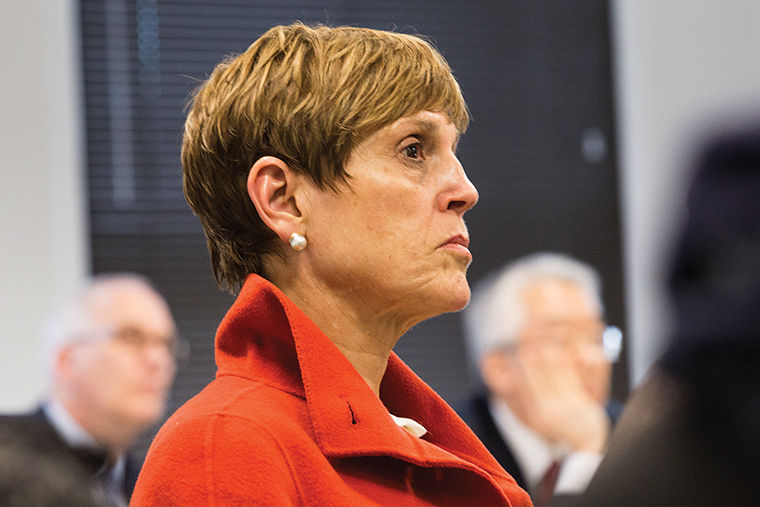Five years, five CFOs
Michelle Gates
February 29, 2016
Michelle Gates, vice president of Business Affairs and chief financial officer, has left the college just one year and nine months after being hired in June 2014. Her last day was Feb. 26, according to a Feb. 25 collegewide email from President and CEO Kwang-Wu Kim.
Gates’ sudden departure adds to Columbia’s reputation for having a revolving door of CFOs—the college has cycled through five of them in the last five years since longtime CFO Michael DeSalle resigned at the end of 2010.
Assuming Gates’ position on an interim basis will be Richard Dowsek, who was interim CFO for seven months prior to Gates. Dowsek formerly served on the Lyric Opera board of directors with Columbia’s board of trustees chairman Dick Kiphart and also chaired the national search committee that hired Gates in 2014.
Columbia’s pattern of short-lived CFOs began in January 2011, when Patricia Heath served as interim CFO for one year and five months. Kenneth Gotsch, from City Colleges of Chicago, then assumed the role for one year and three months until August 2013, when interim CFO Kevin Doherty’s three-month term began.
Gotsch is now a Supervisory Committee member of the School Employees Credit Union in Seattle, Washington, and Doherty is controller of the MacArthur Foundation.
In a Feb. 25 emailed statement, college spokeswoman Cara Birch declined to comment on why Gates left and who was involved in the decision because of confidentiality in personnel matters. She added that the college will launch a search for a new CFO in the coming months but did not specify when.
In the emailed announcement, Kim said Dowsek’s experience with the college will be “invaluable” during the transition.
While CFO, Gates led a series of initiatives to balance the college’s budget and eliminate its deficit, which included a series of deep cuts to the 2016 Fiscal Year budget’s instructional sector and a 12.6 percent increase in the college’s administrative expenses, as reported Nov. 20, 2015 by The Chronicle.
Gates also introduced the college’s first voluntary separation incentive program, or a mass faculty and staff buyout program, at the end of the Spring 2015 Semester, which reduced the college’s workforce by 29 staff members and 30 faculty members.
Along with the VSIP program, Gates introduced several reduction in force initiatives, which terminated full and part-time staff members employed throughout the college.
She also implemented the college’s first performance-based increases for full-time, non-union staff members.
Dowsek said in a June 4, 2014, press release about Gate’s appointment that she stood out from the other potential candidates for her “unique combination of skills, experience and energy” that made her “well-suited” for Columbia.
Gates received her Master’s of Business Administration in 2010 from Arizona State University’s W. P. Carey School of Business, 16 years after she graduated from Portland State University’s School of Business.
Since 2010, Gates had remained at one position for an average of two years. Her longest tenure was at Emerson College in Boston for two years and six months, where she served as a senior associate vice president of Financial Affairs before joining Columbia in July 2014.
Her first business affairs job was as a fiscal coordinator at the University of Oregon for five years and seven months, the longest she has held a position in her career, according to her LinkedIn profile.
Gates helped the college make strategic financial decisions in response to the school’s falling enrollment and led the school’s Civic Commons discussions on aligning resources with goals.
Gates also initiated the process of redesigning the college’s budget model and increased budget transparency by launching a web page on Columbia’s website that breaks down the amount of revenue and expenditures designated to each section of the college.
Jerel Ballard, former SGA president and a junior journalism major, said he worked with Gates during the Spring 2015 Semester to make the budget more comprehensible for students.
Ballard said he found Gates’ departure shocking because a lot of SGA’s initiatives, such as greater transparency and accessibility with regards to budget matters, were planned for implementation with Gates and her team this semester.
Ballard said he hoped for stronger communication with the Business Affairs office this spring semester compared to the previous semesters.
“Of course there could have always been more dialogue with students,” Ballard said. “A lot of [the information] was still unclear for students.”
Arissa Scott, SGA’s student representative to the college’s board of trustees and a senior fashion studies major, said she recently worked with Gates on continuing the conversation about budget transparency with SGA members and other student organizations.
Scott said she was “thrown off” by the news because she just saw Gates at the college’s board of trustees Feb. 4 meeting.
“Everything was perfectly fine and we were talking about her coming in to do budget transparency stuff,” Scott said. “I am just as shocked as everyone else.”
Neither the administration nor the trustees would comment pleading confidentiality requirements in personnel matters.








